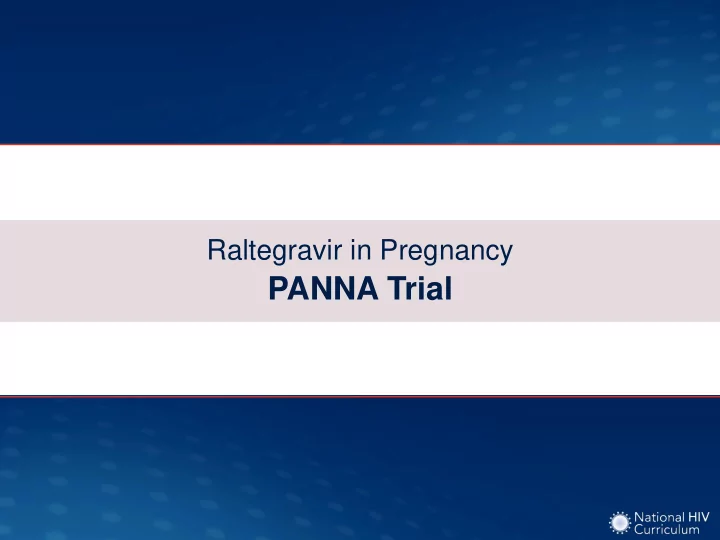

Raltegravir in Pregnancy PANNA Trial
Raltegravir in Pregnancy PANNA: Study Design Study Design: PANNA Network Study • Background : Open-label, nonrandomized, phase 4 trial evaluating the effects of pregnancy on the pharmacokinetics of raltegravir and its safety and efficacy in pregnant women with HIV. • Inclusion Criteria (n =52) Raltegravir 400 mg BI+ - Age ≥18 years Background ART - Taking raltegravir 400 mg BID ≥2 weeks prior to (n = 22) initial assessment in 3 rd trimester of pregnancy - On raltegravir for optimization/intensification of 3-drug regimen or as alternative to another ART medication • Treatment Arm - Raltegravir + background antiretroviral regimen Source: Blonk MI, et al. Clin Infect Dis. 2015;61:809-16.
Raltegravir in Pregnancy PANNA: Results Virologic Suppression at Delivery Raltegravir + Background ART 100 HIV RNA < 50 copies/mL (%) 86 80 60 40 20 19/22 0 Source: Blonk MI, et al. Clin Infect Dis. 2015;61:809-16.
Raltegravir in Pregnancy PANNA: Results Pregnancy Outcomes Raltegravir + Background ART 100 100 80 Infants (%) 60 40 20 14 0 Small for gestational age (SGA) HIV DNA PCR negative Source: Blonk MI, et al. Clin Infect Dis. 2015;61:809-16.
Raltegravir in Pregnancy PANNA: Conclusions Conclusions : “Raltegravir was well tolerated during pregnancy. The pharmacokinetics of raltegravir showed extensive variability. The observed mean decrease in exposure to raltegravir during third trimester compared to postpartum is not considered to be of clinical importance. Raltegravir can be used in standard dosages in HIV-infected pregnant women.” Source: Blonk MI, et al. Clin Infect Dis. 2015;61:809-16.
Acknowledgment The National HIV Curriculum is an AIDS Education and Training Center (AETC) Program supported by the Health Resources and Services Administration (HRSA) of the U.S. Department of Health and Human Services (HHS) as part of an award totaling $800,000 with 0% financed with non-governmental sources. This project is led by the University of Washington’s Infectious Diseases Education and Assessment (IDEA) Program. The content in this presentation are those of the author(s) and do not necessarily represent the official views of, nor an endorsement, by HRSA, HHS, or the U.S. Government.
Recommend
More recommend